2015年高考英语江苏卷完形填空(附答案)
李辉老师 高考英语完形填空“压箱底”好题60篇-答案
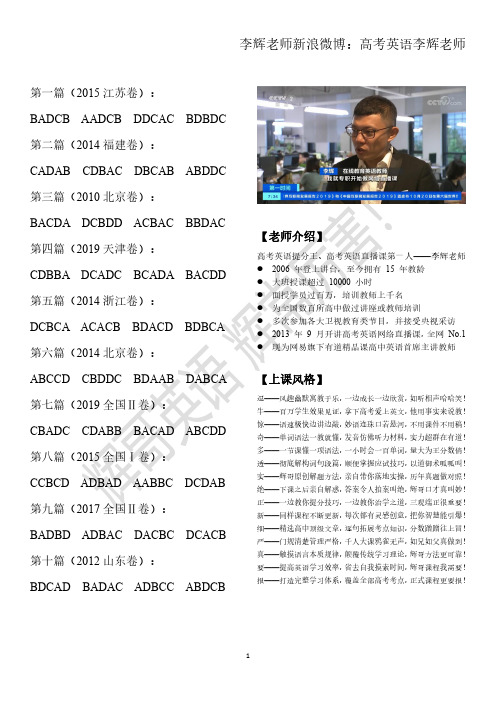
第一篇(2015江苏卷):BADCB AADCB DDCAC BDBDC 第二篇(2014福建卷):CADAB CDBAC DBCAB ABDDC 第三篇(2010北京卷):BACDA DCBDD ACBAC BBDAC 第四篇(2019天津卷):CDBBA DCADC BCADA BACDD 第五篇(2014浙江卷):DCBCA ACACB BDACD BDBCA 第六篇(2014北京卷):ABCCD CBDDC BDAAB DABCA 第七篇(2019全国Ⅱ卷):CBADC CDABB BACAD ABCDD 第八篇(2015全国Ⅰ卷):CCBCD ADBAD AABBC DCDAB 第九篇(2017全国Ⅱ卷):BADBD ADBAC DACBC DCACB 第十篇(2012山东卷):BDCAD BADAC ADBCC ABDCB 【老师介绍】高考英语提分王、高考英语直播课第一人——李辉老师●2006年登上讲台,至今拥有15年教龄●大班授课超过10000小时●面授学员过百万,培训教师上千名●为全国数百所高中做过讲座或教师培训●多次参加各大卫视教育类节目,并接受央视采访●2013年9月开讲高考英语网络直播课,全网No.1●现为网易旗下有道精品课高中英语首席主讲教师【上课风格】逗——风趣幽默寓教于乐,一边成长一边欣赏,如听相声哈哈笑!牛——百万学生效果见证,拿下高考爱上英文,他用事实来说教!惊——语速极快边讲边敲,妙语连珠口若悬河,不用课件不用稿!奇——单词语法一教就懂,发音仿佛听力材料,实力超群在有道!多——一节课懂一项语法,一小时会一百单词,量大为王分数俏!透——彻底解构词句段篇,顺便掌握应试技巧,以道御术呱呱叫!实——辉哥原创解题方法,亲自带你落地实操,历年真题做对照!绝——下课之后亲自解惑,答案令人拍案叫绝,辉哥口才真叫妙!正——一边教你提分技巧,一边教你治学之道,三观端正很重要!新——同样课程不断更新,每次都有灵感创意,把你智慧能引爆!细——精选高中顶级文章,逐句拓展考点知识,分数蹭蹭往上冒!严——门规清楚管理严格,千人大课鸦雀无声,如兄如父真做到!真——触摸语言本质规律,颠覆传统学习理论,辉哥方法更可靠!要——提高英语学习效率,省去自我摸索时间,辉哥课程我需要!报——打造完整学习体系,覆盖全部高考考点,正式课程更要报!第十三篇(2016全国Ⅰ卷):第十四篇(2013全国Ⅱ卷):ADBBA CBDCA CDBCA DDBCA第十五篇(2019北京卷):CDBDB ABABD CDCAD CABAC第十六篇(2019江苏卷):DBCAC BABDD CADCD BBCAA第十七篇(2017-11月浙江卷):CCBDD BACBD ADAAC BADBC第二十三篇(2018江苏卷):第二十七篇(2019浙江卷):第二十八篇(2014福建卷):CADAB CDBAC DBCAB ABDDC第二十九篇(2016全国Ⅱ卷):DABCA DAACD ABBCC DDBCB第三十篇(2016浙江卷):CADBB CCDDA CBABA DBADCBACDB ADCDC ACBCD DBABA第三十七篇(2014全国Ⅰ卷):第四十篇(2015上海卷):ACBDC CABBA ADBDC第四十一篇(2007山东卷):BDCCD CBABD CAABA CCADB 第四十二篇(2014上海卷):CBADA BCDAC DDBBC第四十三篇(2015浙江卷):DBABC CABDC AADCD ABADB 第四十四篇(2018全国Ⅰ卷):BCADD CBDCB CACBA DBADA 第四十五篇(2017上海春卷):CABDD ABDCB ABCCD第四十六篇(2019全国Ⅰ卷):DCCBA CDCAB DABDA CBDAB 第四十七篇(2017全国Ⅰ卷):ABCDA CBADB DBCAC DACBD 第四十八篇(2018全国Ⅰ卷):BCADD CBDCB CACBA DBADA 第四十九篇(2013全国Ⅰ卷):CCDAB DABAC CDDBA BCADB 第五十篇(2016全国Ⅲ卷):BDACA BDCCA BCBDA CDAAB “语言之道”公益社群活动方案{活动目的}●把语言学科拉下神坛,让普通学生考出高分!●提升【理解力】,进而提升学习力、整合力、洞察力;●提升【表达力】,进而提升沟通力、说服力、影响力。
2015高考英语完形填空及阅读理解回顾练习(12)及答案
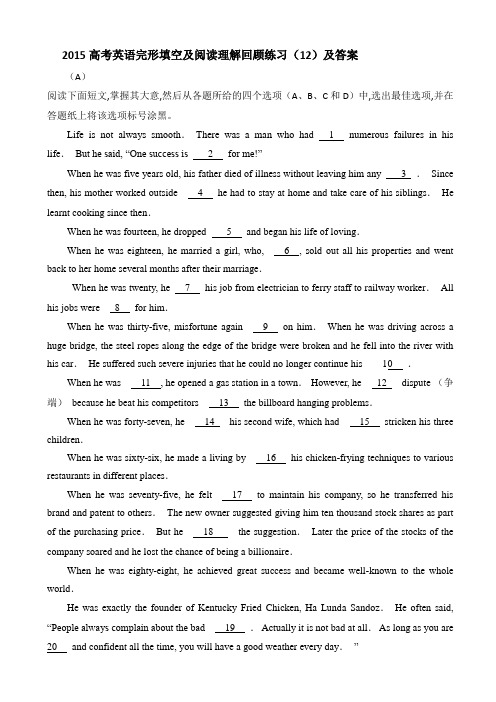
2015高考英语完形填空及阅读理解回顾练习(12)及答案(A)阅读下面短文,掌握其大意,然后从各题所给的四个选项(A、B、C和D)中,选出最佳选项,并在答题纸上将该选项标号涂黑。
Life is not always smooth.There was a man who had 1 numerous failures in his life.But he said, “One success is 2 for me!”When he was five years old, his father died of illness without leaving him any 3 .Since then, his mother worked outside 4 he had to stay at home and take care of his siblings.He learnt cooking since then.When he was fourteen, he dropped 5 and began his life of loving.When he was eighteen, he married a girl, who, 6 , sold out all his properties and went back to her home several months after their marriage.When he was twenty, he 7 his job from electrician to ferry staff to railway worker.All his jobs were 8 for him.When he was thirty-five, misfortune again 9 on him.When he was driving across a huge bridge, the steel ropes along the edge of the bridge were broken and he fell into the river with his car.He suffered such severe injuries that he could no longer continue his 10 .When he was 11 , he opened a gas station in a town.However, he 12 dispute (争端)because he beat his competitors 13 the billboard hanging problems.When he was forty-seven, he 14 his second wife, which had 15 stricken his three children.When he was sixty-six, he made a living by 16 his chicken-frying techniques to various restaurants in different places.When he was seventy-five, he felt 17 to maintain his company, so he transferred his brand and patent to others.The new owner suggested giving him ten thousand stock shares as part of the purchasing price.But he 18 the suggestion.Later the price of the stocks of the company soared and he lost the chance of being a billionaire.When he was eighty-eight, he achieved great success and became well-known to the whole world.He was exactly the founder of Kentucky Fried Chicken, Ha Lunda Sandoz.He often said, “People always complain about the bad 19 .Actually it is not bad at all.As long as you are 20 and confident all the time, you will have a good weather every day.”1.A.achieved B.undergone C.tried D.undertook 2.A.great B.important C.valuable D.enough3.A.words B.money C.property D.families4.A.while B.but C.when D.so5.A.in B.out C.down D.up 6.A.meanwhile B.moreover C.however D.therefore 7.A.started B.took C.lost D.changed8.A.fit B.tough C.unusual D.adequate9.A.fell B.hit C.put D.rested10.A.life B.major C.job D.education 11.A.forty B.thirty-five C.fifty-three D.seventy12.A.went through B.came intoC.came about D.went against13.A.contributing to B.judging fromC.owing to D.leading to14.A.changed B.married C.missed D.divorced 15.A.deeply B.highly C.generally D.thickly 16.A.learning B.promoting C.developing D.teaching 17.A.powerless B.depressedC.disappointed D.hopeless18.A.turned up B.turned toC.turned down D.turned in19.A.difficulties B.misfortune C.life D.weather20.A.hard-working B.brave C.cautious D.optimistic【参考答案】BDCAB CDBAC ABCDA BACDD【山东省潍坊市2014高考英语一模试题】BWhen my parents were alive,they were not very rich.Yet they helped their two older 21 time after time.When Daddy passed away,his notebook showed debts 22 from several of his children.I was not among them.I 23 borrowed money and when I did,I set a repayment plan and 24 to it.It was a matter of 25 with me.I couldn’tstand owing my parents-or anyone else-mmoney because I watched them 26 to help out my older sisters when they were in financial difficulties themselves.These days,after the death of my parents,I am one of those people who can be 27 to for help when they need it.Just as I can’t stand 28 other people money,I can’t stand saying no to whoever needs help.I don’t 29 helping others,but I would be more than glad if they would make a(n) 30 to handle things themselves,perhaps by doing some 31 planning-like planning not to speend money they don’t have!Being ready to help others is a 32 ,but sometimes the result will be 33 to what you expect.I 34 remember as a child what my father always said,“If at first you don’t succeed,try,try again!” Helping my children too often has 35 them from learning to keep trying.Use your 36:who among my children will 37 to walk if I supply the money to buy a car? Helped often,my children lost gradually the ability to 38 problems themselves.In most 39 ,when people find you can 40 help,they will ask you more and more.That's human,you know.21.A.sons B.daughters C.brothers D.sisters22.A.absent B.apart C.due D.different23.A.always B.seldom C.often D.never24.A.stuck B.attached C.agreed D.belonged25.A.pleasure B.courage C.pride D.sorrow26.A.struggle B.happen C.intend D.move27.A.referred B.turned C.seen D.attended28.A.cheating B.donating C.1ending D.owing29.A.enjoy B.mind C.1ike D.miss30.A.comment B.mess C.excuse D.effort31.A.financial B.flexible C.typical D.particular32.A.deed B.deal C.virtue D.task33.A.contrary B.essential C.potential D.necessary34.A.can B.may C.shall D.must35.A.banned B.protected C.prevented D.freed36.A.aHn B.leg C.body D.head37.A.wait B.urge C.threat D.choose38.A.solve B.assess C.seek D.analyse39.A.affairs B.choices C.cases D.events40.A.obtain B.attain C.provide D.prefer【参考答案】21—40、BCBAC ABDBD ACAAC DDACC完形填空专题3议论文型完形填空专题导读议论文是高考完形填空中较难的一种文体,一般由三个要素组成:论点、论据、结论。
2015年江苏卷高考英语阅读题真题解析
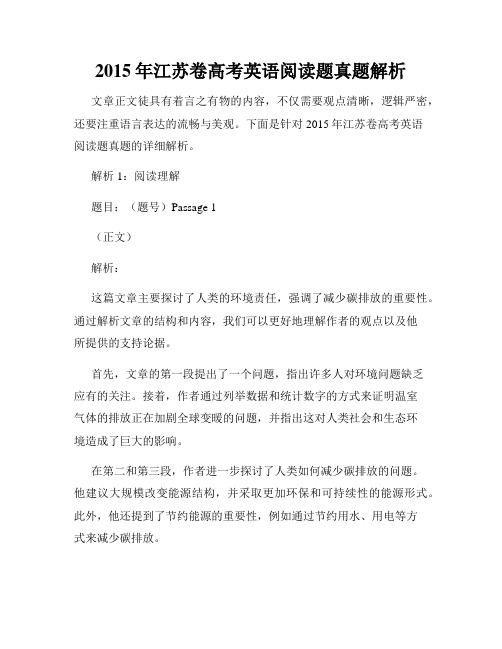
2015年江苏卷高考英语阅读题真题解析文章正文徒具有着言之有物的内容,不仅需要观点清晰,逻辑严密,还要注重语言表达的流畅与美观。
下面是针对2015年江苏卷高考英语阅读题真题的详细解析。
解析1:阅读理解题目:(题号)Passage 1(正文)解析:这篇文章主要探讨了人类的环境责任,强调了减少碳排放的重要性。
通过解析文章的结构和内容,我们可以更好地理解作者的观点以及他所提供的支持论据。
首先,文章的第一段提出了一个问题,指出许多人对环境问题缺乏应有的关注。
接着,作者通过列举数据和统计数字的方式来证明温室气体的排放正在加剧全球变暖的问题,并指出这对人类社会和生态环境造成了巨大的影响。
在第二和第三段,作者进一步探讨了人类如何减少碳排放的问题。
他建议大规模改变能源结构,并采取更加环保和可持续性的能源形式。
此外,他还提到了节约能源的重要性,例如通过节约用水、用电等方式来减少碳排放。
最后,文章给出了一个呼吁,希望人们能够意识到自己对环境的责任,并采取行动来改变现状。
作者提醒我们,只有通过共同努力,我们才能保护地球,保护我们的家园。
综上所述,这篇文章采用了一个逐步展开的结构,通过列举事实和数据、提出解决方案以及呼吁行动的方式,来解释人类的环境责任以及减少碳排放的重要性。
解析2:完形填空题目:(题号)Passage 2(正文)解析:这篇文章是一篇记叙文,讲述了一个关于友谊和团结的故事。
通过解析文章的语言特点和情节发展,我们可以更好地理解故事的主旨和作者要传达的信息。
首先,文章的第一段引入了故事的背景和人物。
接着,在接下来的几段中,作者描绘了主人公们之间的友谊,并以一次意外的事故作为导火索,引发了剧情的转折点。
在故事的高潮部分,主人公们面临着困难和挑战。
然而,在关键时刻,他们团结一致,互相帮助,并为了共同的目标而努力奋斗。
最终,他们成功地克服了困难,并取得了胜利。
通过这个故事,作者试图传达的信息是:友谊和团结的力量是无穷的,在面对困难和挑战时,我们应该相互帮助,共同努力,才能战胜困难并取得成功。
2015年英语高考全国各地完形填空试题及解析(全文翻译)
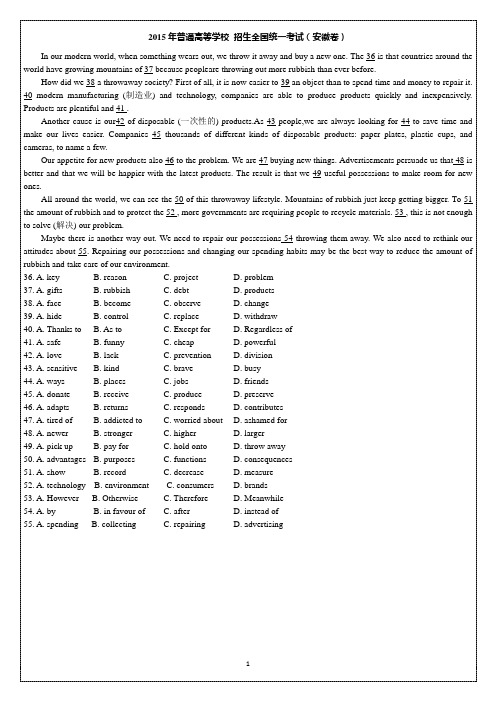
In our modern world, when something wears out, we throw it away and buy a new one. The 36 is that countries around the world have growing mountains of 37 because peopleare throwing out more rubbish than ever before.How did we 38 a throwaway society? First of all, it is now easier to 39 an object than to spend time and money to repair it.40 modern manufacturing (制造业) and technology, companies are able to produce products quickly and inexpensively. Products are plentiful and 41 .Another cause is our42 of disposable (一次性的) products.As 43 people,we are always looking for 44 to save time and make our lives easier. Companies 45 thousands of different kinds of disposable products: paper plates, plastic cups, and cameras, to name a few.Our appetite for new products also 46 to the problem. We are 47 buying new things. Advertisements persuade us that 48 is better and that we will be happier with the latest products. The result is that we 49 useful possessions to make room for new ones.All around the world, we can see the 50 of this throwaway lifestyle. Mountains of rubbish just keep getting bigger. To 51 the amount of rubbish and to protect the 52 , more governments are requiring people to recycle materials. 53 , this is not enough to solve (解决) our problem.Maybe there is another way out. We need to repair our possessions 54 throwing them away. We also need to rethink our attitudes about 55. Repairing our possessions and changing our spending habits may be the best way to reduce the amount of rubbish and take care of our environment.36. A. key B. reason C. project D. problem37. A. gifts B. rubbish C. debt D. products38. A. face B. become C. observe D. change39. A. hide B. control C. replace D. withdraw40. A. Thanks to B. As to C. Except for D. Regardless of41. A. safe B. funny C. cheap D. powerful42. A. love B. lack C. prevention D. division43. A. sensitive B. kind C. brave D. busy44. A. ways B. places C. jobs D. friends45. A. donate B. receive C. produce D. preserve46. A. adapts B. returns C. responds D. contributes47. A. tired of B. addicted to C. worried about D. ashamed for48. A. newer B. stronger C. higher D. larger49. A. pick up B. pay for C. hold onto D. throw away50. A. advantages B. purposes C. functions D. consequences51. A. show B. record C. decrease D. measure52. A. technology B. environment C. consumers D. brands53. A. However B. Otherwise C. Therefore D. Meanwhile54. A. by B. in favour of C. after D. instead of55. A. spending B. collecting C. repairing D. advertising36. D 37. B 38. B 39. C 40. A 41. C 42. A 43. D 44. A 45. C 46. D 47. B 48. A 49. D 50. D51. C 52. B 53. A 54. D 55. C【翻译】在我们现代的世界里,当有什么东西穿出来的时候,我们就把它扔了,买了一个新的。
2015年英语高考全国卷二完形填空 详解和译文
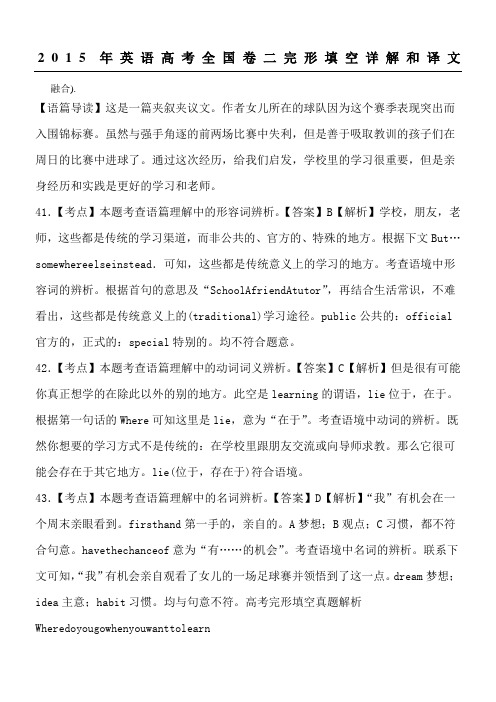
2015年英语高考全国卷二完形填空详解和译文融合).【语篇导读】这是一篇夹叙夹议文。
作者女儿所在的球队因为这个赛季表现突出而入围锦标赛。
虽然与强手角逐的前两场比赛中失利,但是善于吸取教训的孩子们在周日的比赛中进球了。
通过这次经历,给我们启发,学校里的学习很重要,但是亲身经历和实践是更好的学习和老师。
41.【考点】本题考查语篇理解中的形容词辨析。
【答案】B【解析】学校,朋友,老师,这些都是传统的学习渠道,而非公共的、官方的、特殊的地方。
根据下文But…somewhereelseinstead.可知,这些都是传统意义上的学习的地方。
考查语境中形容词的辨析。
根据首句的意思及“SchoolAfriendAtutor”,再结合生活常识,不难看出,这些都是传统意义上的(traditional)学习途径。
public公共的:official官方的,正式的:special特别的。
均不符合题意。
42.【考点】本题考查语篇理解中的动词词义辨析。
【答案】C【解析】但是很有可能你真正想学的在除此以外的别的地方。
此空是learning的谓语,lie位于,在于。
根据第一句话的Where可知这里是lie,意为“在于”。
考查语境中动词的辨析。
既然你想要的学习方式不是传统的:在学校里跟朋友交流或向导师求教。
那么它很可能会存在于其它地方。
lie(位于,存在于)符合语境。
43.【考点】本题考查语篇理解中的名词辨析。
【答案】D【解析】“我”有机会在一个周末亲眼看到。
firsthand第一手的,亲自的。
A梦想;B观点;C习惯,都不符合句意。
havethechanceof意为“有……的机会”。
考查语境中名词的辨析。
联系下文可知,“我”有机会亲自观看了女儿的一场足球赛并领悟到了这一点。
dream梦想;idea主意;habit习惯。
均与句意不符。
高考完形填空真题解析Wheredoyougowhenyouwanttolearn[评析]这句话起到承上启下的作用,作者有这样一个机会目睹第一手的材料,以下的女儿踢球的故事印证了作者要表达的主题:通过亲自体验和领悟,能够学到更有价值的东西。
2015高考英语完形填空及阅读理解回顾练习(8)及答案
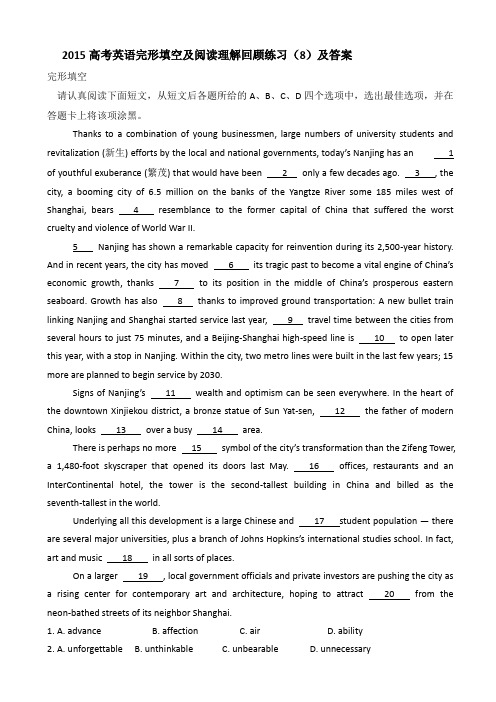
2015高考英语完形填空及阅读理解回顾练习(8)及答案完形填空请认真阅读下面短文,从短文后各题所给的A、B、C、D四个选项中,选出最佳选项,并在答题卡上将该项涂黑。
Thanks to a combination of young businessmen, large numbers of university students and revitalization (新生) efforts by the local and national governments, today’s Nanjing h as an 1 of youthful exuberance (繁茂) that would have been 2 only a few decades ago. 3 , the city, a booming city of 6.5 million on the banks of the Yangtze River some 185 miles west of Shanghai, bears 4 resemblance to the former capital of China that suffered the worst cruelty and violence of World War II.5 Nanjing has shown a remarkable capacity for reinvention during its 2,500-year history. And in recent years, the city has moved6 its tragic past to become a vital engine of China’s economic growth, thanks7 to its position in the middle of China’s prosperous eastern seaboard. Growth has also8 thanks to improved ground transportation: A new bullet train linking Nanjing and Shanghai started service last year,9 travel time between the cities from several hours to just 75 minutes, and a Beijing-Shanghai high-speed line is 10 to open later this year, with a stop in Nanjing. Within the city, two metro lines were built in the last few years; 15 more are planned to begin service by 2030.Signs of Nanjing’s 11 wealth and optimism can be seen everywhere. In the heart of the downtown Xinjiekou district, a bronze statue of Sun Yat-sen, 12 the father of modern China, looks 13 over a busy 14 area.There is perhaps no more 15 symbol of the city’s transformation than the Zifeng Tower, a 1,480-foot skyscraper that opened its doors last May. 16 offices, restaurants and an InterContinental hotel, the tower is the second-tallest building in China and billed as the seventh-tallest in the world.Underlying all this development is a large Chinese and 17 student population — there are several major universities, plus a branch of Johns Hopkins’s international studies school. In fact, art and music 18 in all sorts of places.On a larger 19 , local government officials and private investors are pushing the city as a rising center for contemporary art and architecture, hoping to attract 20 from the neon-bathed streets of its neighbor Shanghai.1. A. advance B. affection C. air D. ability2. A. unforgettable B. unthinkable C. unbearable D. unnecessary3. A. Actually B. Regretfully C. Hopefully D. Consequently4. A. close B. slight C. much D. little5. A. Because B. But C. As D. Since6. A. beyond B. on C. off D. out7. A. in addition B. in all C. in part D. in fact8. A. started B. enlarged C. existed D. accelerated9. A. removing B. cutting C. dividing D. lowering10. A. scheduled B. invented C. desired D. meant11. A. attractive B. well-received C. newfound D. discovered12. A. thought B. treated C. considered D. elected13. A. out B. at C. about D. for14. A. remote B. regional C. rural D. commercial15. A. universal B. visible C. traditional D. political16. A. Keeping B. Consisting C. Opening D. Housing17. A. British B. western C. American D. foreign18. A. spring up B. stand up C. set up D. keep up19. A. extent B. degree C. scale D. level20. A. businessmen B. students C. tourists D. painters【参考答案】1—10、C B A D B A C D B A11—20、C C A D B D D A C C【吉林省九校联合体2014高考英语二模试题】完形填空(共20小题:每小题1.5分,满分30分)阅读下面短文,从短文后各题所给的四个选项(A、B、C、D)中,选出可以填入空白处的最佳选项,并在答题卡上将该项涂黑。
高中英语真题-2015高考英语四月完形填空、阅读理解课外练习(1)答案
高中英语真题:2015高考英语四月完形填空、阅读理解课外练习(1)答案【2015高考复习】阅读理解Having good etiquette (礼节) at the workplace is very important to be a favorite in an offi ce.However,it’s observed that many people aren’t aware of the workplace etiquette and this creates a very bad impression in the office. So it’s important to know some workplace etiquette tips. Among all the workplace etiquette guidelines,the most important is to be punctual to your office.Though goi ng late due to an emergency is okay,habitual late comers are never appreciated in any organizatio n.By arriving at your office on time,you show that you’re aware of your responsibilities and have r espect for the organization.In case you feel that you would be late,call the concerned authority and report the matter to him or he r.Also,a proper knowledge of the workplace email etiquette is a must.In the official emails,you need to mention the subject concisely,while at the same time include all the important details which are to be shared.You should use good and grammatically corr ect language while writing emails.A knowledge of telephone etiquette in the workplace is very i mportant as well.While talking on the telephone,be polite and listen to what they’re saying carefully.Only then should you say what you feel.Speak in a voice which would b e heard clearly at the other end.The workplace guidelines are important even while you’re dini ng or celebrating with your coworkers.If you get a call in betw een,receive it after you’re permitted by the others by saying “excu se me”.Don’t talk loudly while eating.Greet people well and t ry to make them feel comfortable while being in your company .These guidelines will help you become the best employee of a company.All the best!【语篇解读】在工作中要想成为办公室里受欢迎的人,有好的礼节是很重要的。
2015年高考英语江苏卷(含详细答案)
英语试卷 第1页(共34页)英语试卷 第2页(共34页)绝密★启用前2015普通高等学校招生全国统一考试(江苏卷)英语注意事项考生在答题前请认真阅读本注意事项及各题答题要求1. 本试卷共12页,包含选择题(第1题~第70题,共70题)、非选择题(第71题~第81题,共11题)两部分。
本卷满分为120分,考试时间为120分钟。
考试结束后,请将本试卷和答题卡一并交回。
2. 答题前,请务必将自己的姓名、准考证号用0.5毫米黑色墨水的签字笔填写在试卷及答题卡的规定位置上。
3. 请认真核对监考员在答题卡上所粘贴的条形码上的姓名、准考证号与本人是否相符。
4. 作答选择题,必须用2B 铅笔把答题卡上对应选项的方框涂满、涂黑;如需改动,请用橡皮擦干净后,再选涂其他答案。
作答非选择题,必须用0.5毫米黑色墨水的签字笔在答题卡上的指定位置作答,在其他位置作答一律无效。
第一部分 听力(共两节,满分20分)做题时,先将答案标在试卷上。
录音内容结束后,你将有两分钟的时间将试卷上的答案转涂到答题卡上。
第一节 (共5小题;每小题1分,满分5分)听下面5段对话。
每段对话后有一个小题,从题中所给的A 、B 、C 三个选项中选出最佳选项,并标在试卷的相应位置。
听完每段对话后,你都有10秒钟的时间来回答有关小题和阅读下一小题。
每段对话仅读一遍。
例: How much is the shirt? A. £19.15. B. £9. 18.C. £9.15.答案是C 。
1. What time is it now?A. 9:10.B. 9:50.C. 10:00. 2. What does the woman think of the weather? A. It’s nice. B. It’s warm. C. It’s cold. 3. What will the man do? A. Attend a meeting. B. Give a lecture. C. Leave his office. 4. What is the woman’s opinion about the course? A. Too hard. B. Worth taking. C. Very easy. 5. What does the woman want the man to do? A. Speak louder. B. Apologize to her.C. Turn off the radio.第二节 (共15小题;每小题1分,满分15分)听下面5段对话或独白。
2015高考英语完形填空及阅读理解回顾练习(10)及答案
2015高考英语完形填空及阅读理解回顾练习(10)及答案完形填空(A)阅读下面短文,掌握其大意,然后从36—55各题所给的四个选项(A、B、C、和D)中,选出最佳选项。
Lately, I’ve been talking about success with design students both at the school where I teach and at other programs that I visit. When I ask, “What is success?” The fir st response is, invariably(总是), “Getting a(n) 1 and making money.” It 2 some searching to arrive at a richer answer.3 , getting paid is a baseline for success in any field. Putting this criterion on the table is a(n)4 step.When I ask design students to talk about what makes design different from the fine 5 , they gravitate towards(被吸引到) the role of the client. Designers serve clients, or so the logic goes, 6 artists serve themselves.Although it is true that designers generally rely on clients, pleasing them is not the 7 purpose of our work. What designers share with our clients is the 8 . Our clients wouldn’t need us at all if we weren’t helping them 9 that public. The public may never know who designed the coffee cup t hey’re holding, the magazine they’re reading or the sign that’s 10 them where to go. But they’re seeing it, and some of them might, at some level, have their 11 enlivened(使有生气), simplified or otherwise improved by it. One way to think about success is asking whether your work gets 12 or used, and if so, whether using it improves people’s lives.Designers have many ways to 13 to their profession and to see and be seen in the design world. One is entering competitions and 14 work to annuals and exhibitions. Another is 15 the design community—going to events, lectures and conferences, and helping to organize them, too. Yet another involves 16 and writing. Blogs and online journals like this one enable any designer to have a voice and share ideas.Success is 17 going to work every day and getting paid. Success means finding personal satisfaction 18 your work and loving what you do. And it means engaging with a(n) 19 world: a world of clients and employers, but also of readers, users and other designers. It is those things that make us 20 .1、A、family B、interview C、job D、award2、A、involves B、raises C、acquires D、takes3、A、Again B、Indeed C、Well D、Often4、A、single B、unusual C、necessary D、extra5、A、ideas B、clothes C、collections D、arts6、A、while B、and C、it D、because7、A、final B、double C、original D、correct8、A、concept B、public C、pattern D、usage9、A、believe B、agree C、realize D、reach10、A、discussing B、showing C、equipping D、featuring11、A、spirits B、offices C、lives D、houses12、A、seen B、paid C、asked D、talked13、A、expect B、design C、contribute D、compare14、A、exchanging B、negotiating C、assigning D、presenting15、A、passing through B、participating inC、running off D、searching for16、A、reading B、listening C、speaking D、signing17、A、rather than B、other than C、more than D、less than18、A、in B、at C、of D、to19、A、natural B、social C、inside D、modern20、A、happy B、excited C、free D、rich【参考答案】CDBCD AABDB CACDB ACABD【山东省菏泽市2014高考英语一模试题】BWhen I was a small boy my family was very poor. My father always used his savings to 21 my mother to visit her parents who lived far away. There was just my younger brother and myself in the house. One evening Dad came home from 22 and there was no food in the house, not 23 a piece of bread. Although we were 24 , my brother and I went to bed without eating anything.My father had no money, but I knew from the 25 on his face that he could not let us have an empty stomach. He 26 the house and about two hours later returned and quickly 27 us up. He had in his hand two small potato pies, which he gave us to eat. I don't know where he got the 28 but somehow he 29 to get us something to eat.My father had not eaten and had worked all day 30 he sat there with great satisfaction watching us eat. This has 31 stayed in my mind and left more of an impression than any amount of 32 he may ever have given me.At that moment, I felt happy knowing that he was there and would not let us 33 .I guess the 34 I am trying to make is that in difficult times it is 35 not to show weakness but strength and character. If a 36 is the cement (粘合剂) that holds a family together, then the father is 37 that strengthens that cement.It is his values and 38 and memories that have carried me forward and helped me to 39 my own problems in life. In my own 40 I have learned that it is the valuable time you spend with your children and the values you give to them that will remain with them always.21. A. force B. encourage C. send D. teach22. A. hospital B. work C. school D. shop23. A. quite B. just C. only D. even24. A. nervous B. hungry C. sleepy D. busy25. A. worry B. pleasure C. disappointment D. surprise26. A. cleaned B. observed C. left D. searched27. A. brought B. put C. called D. woke28. A. chance B. food C. support D. recipe29. A. managed B. decided C. agreed D. waited30. A. so B. or C. but D. and31. A. normally B. always C. shortly D. softly32. A. cost B. time C. salary D. money33. A. suffer B. know C. leave D. cry34. A. decision B. promise C. point D. apology35. A. strange B. important C. difficult D. common36. A. father B. brother C. sister D. mother37. A. something B. anything C. everything D. nothing38. A. words B. records C. actions D. failures39. A. work out B. carry out C. run into D. look into40. A. opinion B. home C. order D. turn【参考答案】21—25 CBDBA 26—30 CDBAC 31—35 BDACB 36—40 DACAD第1模块完形填空模块导读(4)探究点三前制性、后制性和语篇性的设空完形填空答案有的由已读过的上文决定,有的由未读过的下文决定,还有的要综合上下文而定,这三种设空方法分别称为前制性设空、后制性设空和语篇性设空。
2015年高考英语江苏卷(含详细答案)
英语试卷 第1页(共32页)英语试卷 第2页(共32页)绝密★启用前2015普通高等学校招生全国统一考试(江苏卷)英语第一部分 听力(共两节,满分20分)做题时,先将答案标在试卷上。
录音内容结束后,你将有两分钟的时间将试卷上的答案转涂到答题卡上。
第一节 (共5小题;每小题1分,满分5分)听下面5段对话。
每段对话后有一个小题,从题中所给的A 、B 、C 三个选项中选出最佳选项,并标在试卷的相应位置。
听完每段对话后,你都有10秒钟的时间来回答有关小题和阅读下一小题。
每段对话仅读一遍。
例: How much is the shirt? A. £19.15. B. £9. 18.C. £9.15.答案是C 。
1. What time is it now? A. 9:10. B. 9:50. C. 10:00.2. What does the woman think of the weather? A. It’s nice. B. It’s warm. C. It’s cold.3. What will the man do? A. Attend a meeting. B. Give a lecture. C. Leave his office.4. What is the woman’s opinion about the course? A. Too hard. B. Worth taking. C. Very easy.5. What does the woman want the man to do? A. Speak louder. B. Apologize to her.C. Turn off the radio.第二节 (共15小题;每小题1分,满分15分)听下面5段对话或独白。
每段对话或独白后有几个小题,从题中所给的A 、B 、C 三个选项中选出最佳选项,并标在试卷的相应位置。
- 1、下载文档前请自行甄别文档内容的完整性,平台不提供额外的编辑、内容补充、找答案等附加服务。
- 2、"仅部分预览"的文档,不可在线预览部分如存在完整性等问题,可反馈申请退款(可完整预览的文档不适用该条件!)。
- 3、如文档侵犯您的权益,请联系客服反馈,我们会尽快为您处理(人工客服工作时间:9:00-18:30)。
第四部分: 任务型阅读(共10 小题; 每小题1 分, 满分10 分)
请阅读下面短文,并根据所读内容在文章后表格中的空格里填入一个踿踿最恰当的单词。
注意: 请将答案写在答题卡上相应题号的横线上。
每个空格只填一个单词。
People select news in expectation of a reward. This reward may be either of two kinds. One is related to what Freud calls the Pleasure Principle, the other to what he calls the Reality Principle.
For want of better names, we shall call these two classes immediate reward and delayed reward.
In general, the kind of news which may be expected to give immediate reward are news
of crime and corruption, accidents and disasters, sports, social events, and human interest. Delayed reward may be expected from news of public affairs, economic matters, social problems, science,
education, and health.
News of the first kind pays its rewards at once. A reader can enjoy an indirect
experience without any of the dangers or stresses involved. He can tremble wildly at an axe-murder, shake his head sympathetically and safely at a hurricane, identify himself with the winning team, laugh
understandingly at a warm little story of children or dogs.
News of the second kind, however, pays its rewards later. It sometimes requires the reader to tolerate unpleasantness or annoyance—as, for example, when he reads of the threatening foreign situation, the mounting national debt, rising taxes, falling market, scarce housing, and cancer. It has a kind of “threat value."It is read so that th e reader may be informed and prepared. When a reader selects delayed reward news, he pulls himself into the world of surrounding reality to which he can adapt himself only by hard work. When he selects news of the other kind, he usually withdraws from the world of threatening reality toward the dream world.
For any individual, of course, the boundaries of these two classes are not stable. For example, a sociologist may read news of crime as a social problem, rather than for its immediate reward. A coach may read a sports story for its threat value: he may have to play that team next week. A
politician may read an account of his latest successful public meeting, not for its delayed reward, but very much as his wife reads an account of a party. In any given story of corruption or disaster, a thoughtful reader may receive not only the immediate reward of indirect experience, but also the delayed reward of information and preparedness. Therefore, while the division of categories holds in general, an individual's tendency may transfer any story from one kind of reading to another, or divide the experience between the two kinds of reward.。
